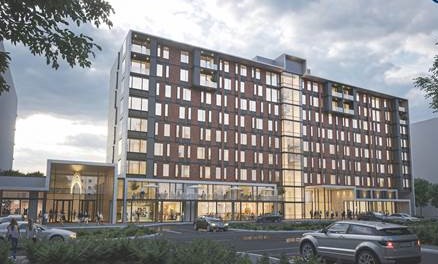MAIN IMAGE: Bryan Biehler, director of Huizemark Franchise Group; Herschel Jawitz, CEO of Jawitz Properties; Jonathan Davies, director Tyson Properties Gauteng; Shaun du Bois, principal with Just Property.
In the dragging economic downturn, the boom in sectional title developments is not such good news for the rental market. Property experts explain why and give good advice to give to landlords.
In a short span of less than ten years the construction of sectional title developments has begun to outpace that of freehold titles in South Africa. According to Sandra Gordon, senior research analyst for Pam Golding Properties, in 2010 only 13.5% of all new residential buildings completed in the country were sectional title properties but by the first quarter of this year that figure had risen to 57.7%. Concurrently sales have also been on the increase with sectional title sales accounting for close to 28% of total residential sales at the end of 2018.
Read: Why sectional title sales are booming in SA
“This is not such good news,” some agents said in comment on the above explaining that the explosion of sectional title developments has led to an oversupply on the market. While favourable for tenants who have an abundance of rental homes to choose from, the situation leaves many landlords under pressure to balance low rental growth rates with the continuing increase of rates and levies.
“The impact on sectional title rental returns has been quite dramatic. There is an over-supply of these properties and they all offer pretty much the same with the exception being lifestyle estates such as those developed by Balwin,” says Bryan Biehler, director of Huizemark Franchise Group.
“The downside that many of our clients are experiencing with sectional title is the split of charges on their levy accounts such as basic charges for water and electricity as well as refuse and sewerage. These charges are in turn being passed onto the tenants which is increasing their monthly expenditure by at least R500-00 over and above their rental and services such as water and electricity consumption,” continues Biehler.
According to the latest PayProp rental index the country’s rental growth rate has remained fairly flat in 2019, similar to the trend seen last year. The rental growth rate for the 2nd quarter was 3.86% (measured year-on-year), well below the country’s inflation rate (which was 4.5% by May this year), but at least it was no longer following a downward trend says Johette Smuts, PayProp’s head of data and analytics.
“The latest PayProp Index is very much indicative of the current rental market, and is, in fact, showing early indications that the rental market is stabilising,” says Herschel Jawitz, CEO of Jawitz Properties. While he believes the key drivers in the rental market are the current economic climate and the price sensitivity of tenants as consumers are under financial pressure, the oversupply of sectional title units has added additional strain.
“In addition, despite the economy, there has been a steady stream of new sectional title developments that have come onto the market in the last 12 months creating a surplus of apartments to rent, which puts further pressure on rentals being achieved by lessors. It will take some while before this surplus of units is taken up by the market and until this happens, and the economy starts to improve, the rental market will remain favourable to tenants,” Jawitz says.
Jonathan Davies, director of Tyson Properties Gauteng, says that in Johannesburg there are a number of larger development companies such as Summercon and Galencia who continue to build sectional title complexes to cater for the demand in the northern areas. “Their product offering is good and attracts new buyers to these homes who benefit as they do not have to pay transfer duty. The newer properties are also sought out by tenants leaving the older homes empty or in need of a price reduction in order to secure a tenant. This surplus will be absorbed over time but while new developments are being built pricing remains under pressure and tenants are spoilt for choice,” he explains.
Neil Abernethy, rental agent from Tyson Properties Atlantic Seaboard, says they’ve observed a downward trend in rental prices over the past 6-18 months and an oversupply of stock on the market is certainly one of the factors contributing to this. Due to a large number of developments having been completed and the Airbnb market showing diminishing returns especially over the winter months, “a glut of properties” have become available.

Sectional title developments are blooming all over the Cape Metropole. One of them is The Galleria in northern suburb Bellville that includes plans for 500 sectional title apartments.
In Johannesburg, they’ve observed that many landlords have not increased rental rates for fear of losing good tenants despite the fact that levies and maintenance costs have gone up says Davies. “This has forced landlords to eat into their return and in some cases to offload their properties to the sales market,” he says.
Property experts believe the surplus in sectional title units will be absorbed by the market over time. In the meantime, they offer the following advice to landlords:
- Make sure you keep good tenants who are looking after your property even if you have to take a lower than inflation escalation in rent, advises Jawitz. “Loosing a good tenant brings about the riskier possibility of a longer than anticipated vacancy and an even lower rental.”
- Ensure the property is well maintained as tenants have become more discerning and with the increased choice out there, landlords will need to ensure their property is in the best possible condition, says Abernethy.
- Property should be looked at as a long term investment says Shaun du Bois, rental expert with Just Property. “Taking a minimum of a 10-year view is needed to appreciate that although right now the returns are not as high as in the past. The combination of the rental income and capital appreciation makes property, in my opinion, the best investment,” he says.
- It is critical to be very careful when placing a tenant.
Ever optimistic, property experts are hopeful that the rental market will make a recovery as we near the summer months. Smuts says she expects a slow recovery towards the end of the year and into early 2020. On Cape Town’s hard-pressed upmarket Atlantic Seaboard, Abernethy says he has already noticed a change in sentiment in the last two months. “There seems to be more urgency shown by prospective tenants in securing tenancies for their desired properties with the busier summer months now approaching,” he says.
Davies is also confident that things are slowly turning around. “The last few months have shown a shift in confidence and the indications are that sentiment is changing for the better. As with any market, things always change and in time to come the rental market will stabilise,” he says.
“Fortune favours the brave and savvy investors continue to snap up investment properties often from owners who may have become fearful,” says Du Bois. His advice to investors/buyers is to always purchase a sectional title unit in large developments as this allows the levy costs to be split between more units. This also allows for better security on the premises as splitting the cost of a guard between a 100 units is far more viable than between 10 units.








